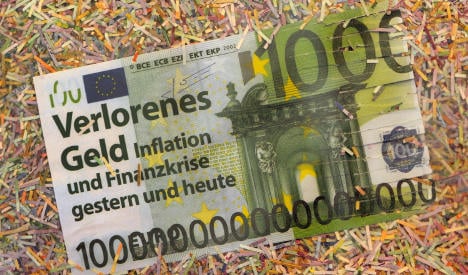With Europe’s biggest economy humming along and the European Central Bank (ECB) pumping billions of euros into the market to tackle the eurozone crisis, experts are worried that inflation could soar.
Thomas Mayer, chief economist at Deutsche Bank, told daily Bild, “a rise in the inflation rate to 4 percent is absolutely possible” in the next two to three years.
Postbank chief economist Marco Bargel agreed, telling the same paper that a 4 percent inflation rate was “realistic – even for several years.”
Germany’s inflation has generally been low in recent years, given workers’ wage restraint and the government’s fiscal tightness. The rate for 2010 was just 1.1 percent.
A key reason for the anticipated inflation spike was the ECB could be forced into a “looser monetary policy without large interest rate rises,” Mayer said.
ECB President Jean-Claude Trichet over the weekend urged central banks to pay attention to inflationary threats from rising commodity prices, which led many to believe the ECB may be moving toward rate hikes.
The news came as the European Financial Stability Facility staged Tuesday a landmark five-year bond auction worth €5 billion to raise funds for Ireland and help calm financial markets.
Asian bidders snapped up more than one third of the total in what EFSF head Klaus Regling said demonstrated market confidence in the 17-nation eurozone, after the turmoil of massive bailouts for Greece and Ireland last year.
“This must be seen as a big success,” Regling told a press briefing near Frankfurt after the figures were released.
“It may well be a turning point” in the eurozone debt crisis, he added.
Demand for the first debt issue by the facility, which was set up on June 7, was “record breaking,” with bids for €44.5 billion, almost nine times as much as was on offer, an EFSF statement said.
“The huge investor interest confirms confidence in the strategy adopted to restore financial stability in the euro area,” Regling said.
The so-called book building process used to establish buyers was completed in a blistering 15 minutes, the EFSF head said. A yield or interest rate of 2.89 percent would be paid on the top-rated bonds and Ireland would borrow €3.3 billion of the amount raised at a higher rate once fees and other charges were taken into account.
“I think the cost for Ireland will be around 6.0 percent” but the precise figure could only be established once the cash reserve and an additional loan buffer have been reinvested, Regling said.
The Local/AFP/djw



 Please whitelist us to continue reading.
Please whitelist us to continue reading.
Member comments